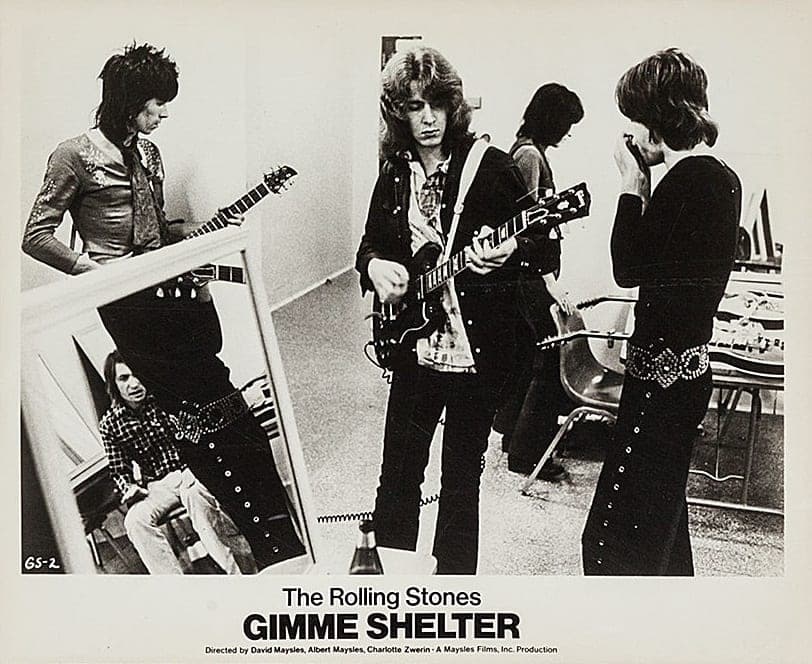
“Gimme Shelter”: The Rolling Stones’ Bleak, Prophetic Cry in a World on Fire
For many of us who lived through the tumultuous closing years of the 1960s, The Rolling Stones were far more than just a rock band; they were the dark mirror reflecting the decade’s crumbling idealism. As the Summer of Love faded into a winter of discontent, marked by escalating conflict, political assassinations, and civil unrest, the Stones, with their primal blues-rock and raw, often cynical, poetry, captured the zeitgeist like no other. Nowhere was this more powerfully articulated than in “Gimme Shelter,” the electrifying and chilling opening track from their monumental 1969 album, “Let It Bleed.” It wasn’t just a song; it was a desperate, urgent prayer for refuge in a world seemingly consumed by chaos.
“Gimme Shelter” was released as the opening track on “Let It Bleed,” which hit shelves in December 1969. The album itself was an immediate and massive commercial success, soaring to number 1 on the UK Albums Chart and reaching number 3 on the Billboard 200 chart in the United States. While “Gimme Shelter” was never officially released as a single at the time, its undeniable power and profound resonance quickly made it a cornerstone of classic rock radio and an enduring fan favorite. Its placement as the album’s opener immediately set a stark, unsettling tone, signaling a departure from the more whimsical psychedelia of their earlier work and firmly establishing their darker, more cynical vision. Its cultural impact, particularly as a soundtrack to the era’s anxieties, far outstripped any traditional chart metrics.
The story behind “Gimme Shelter” is inextricably linked to the socio-political maelstrom of 1968 and 1969. Written by Mick Jagger and Keith Richards, the song was conceived during a period of intense global unrest. Jagger later reflected that the song was composed in the wake of the Vietnam War’s brutal escalation, the assassinations of Martin Luther King Jr. and Robert F. Kennedy, and the pervasive fear of nuclear war. The feeling of impending doom, of a world on the brink, infused every note and lyric. What elevates the song to legendary status, however, is the astonishing, almost supernatural, vocal performance by Merry Clayton. A session vocalist brought in at the last minute, Clayton’s raw, guttural wails, particularly her soaring, cracking “Rape, murder! It’s just a shot away!” during the outro, added an unparalleled layer of desperate anguish and prophetic horror. Legend has it she recorded her part quickly, late at night, while pregnant, delivering a performance so powerful it reportedly caused her to rupture a blood vessel. Her contribution is an indelible, harrowing part of the song’s fabric, transforming it from a great rock track into an iconic, almost spiritual, experience.
The meaning of “Gimme Shelter” is a visceral plea for protection, a desperate cry for refuge from the overwhelming forces of destruction that seemed to be engulfing the world. The lyrics paint a bleak picture of impending doom, using vivid, violent imagery: “Oh, a storm is threatening / My very life today / If I don’t get some shelter / Oh yeah, I’m gonna fade away.” It speaks to the fear of war, violence, and social collapse, capturing the collective anxiety of a generation witnessing their ideals crumble. The chilling line, “War, children, it’s just a shot away,” repeated with terrifying conviction, perfectly encapsulates the sense that violence was omnipresent and inevitable. Yet, amidst the despair, there’s also a glimmer of hope for solace and protection found in human connection, a desperate yearning for love to be a “shelter” from the storm. It’s a powerful, almost apocalyptic vision, delivered with the Stones’ signature blend of blues, grit, and rock ‘n’ roll swagger.
For those of us who recall the visceral impact of “Gimme Shelter” upon its release, it evokes a powerful, almost unsettling, sense of memory. It brings to mind the turbulent headlines, the raw emotion of a decade spiraling into chaos, and the sheer, unadulterated power of The Rolling Stones to articulate the unspoken fears of a generation. It’s a reminder of a time when rock music wasn’t just entertainment, but a vital commentary, a reflection of the world’s deep scars. Even now, decades later, the searing guitar riff, Jagger’s urgent vocals, and especially Merry Clayton’s haunting wails, resonate with undiminished force, pulling us back to that pivotal moment when the world felt like it was teetering on the edge, and all we could do was “gimme shelter.”